Pose is one of a kind: joyful, tragic, gorgeous, and queer. I can honestly say that no other TV show has moved me to tears so frequently. Transgender representation on TV is pretty thin on the ground (even as gay and bisexual representation is on the rise) but here is a show that celebrates the history of the trans community. Specifically, the Black and Latinx trans women who pioneered the New York City ballroom scene in the 1980s.
Music was an integral part of ballroom culture, and this pride month I want to highlight some of my favourite moments where music helps to tell this ground-breaking story.
‘Running Up That Hill (A Deal With God)’
The catalogue of TV shows and movies that have benefited from the timeless poignance of Kate Bush’s ‘Running Up That Hill (A Deal With God)’ recently received another entry from Stranger Things 4. However, I will always associate it with a particular storyline from Pose. In the Pilot we are introduced to Angel—a trans woman, ball-goer, and sex worker—and Stan—a straight white married man from the suburbs.
“If I only could,
I’d make a deal with God,
And I’d get him to swap our places”
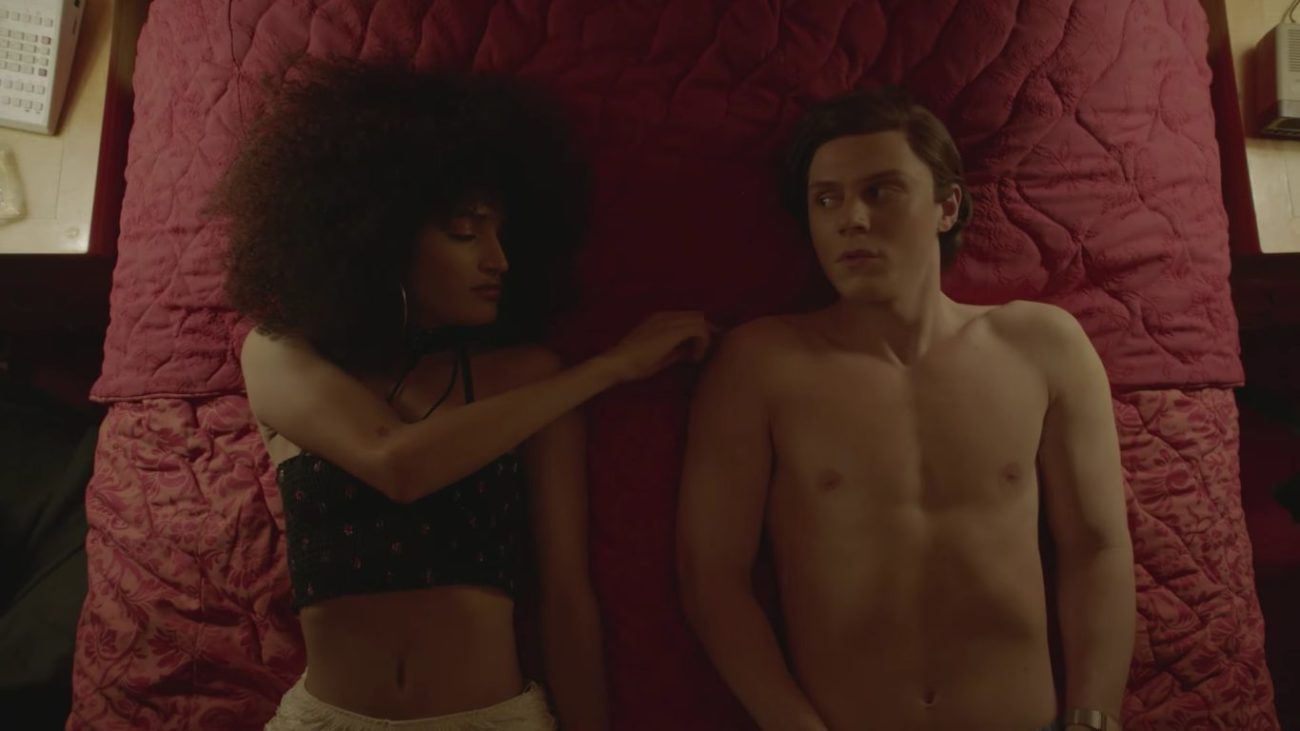
Angel wants what Stan has, and Stan wants what Angel has. Or so they both think. When the song starts playing, Angel and Stan are lying on a bed together, and Angel has just finished telling him that she wants a home and someone to take care of—in direct comparison, we cut away to see Stan sitting down for dinner with his family.
Earlier in the episode, we watched members of the ballroom walking the “executive realness” category. Blanca described how this was a life they could dream of, but would always be out of reach. Meanwhile, Stan has just gotten a job working for Donald Trump (of all people) and is living that life for real. Ironically, Stan believes he has been living inauthentically; he claims to want to experience the way that Angel lives, without a protective facade.
The song starts playing again when Stan is dancing with his wife in the Rainbow Room and he imagines he sees Angel. It plays again at the end of the episode when Stan, despite having a family at home, returns to the piers to see Angel. “This song is gonna be our song from now on,” Angel says after they kiss. This almost looks like the beginning of a romance…and for a while they make a go of it. But the fantasy of two lovers from conflicting worlds just doesn’t match the reality—ultimately, Angel went looking for love in a world that wouldn’t welcome her, when (as later demonstrated by her relationship with Papi) she could have been looking closer to home. Later in the season, when it transpires that Stan was just another chaser all along, the lyrics could take a different meaning—a plea from Angel to be empathised with and for the man she loves to understand what it’s like to be her.
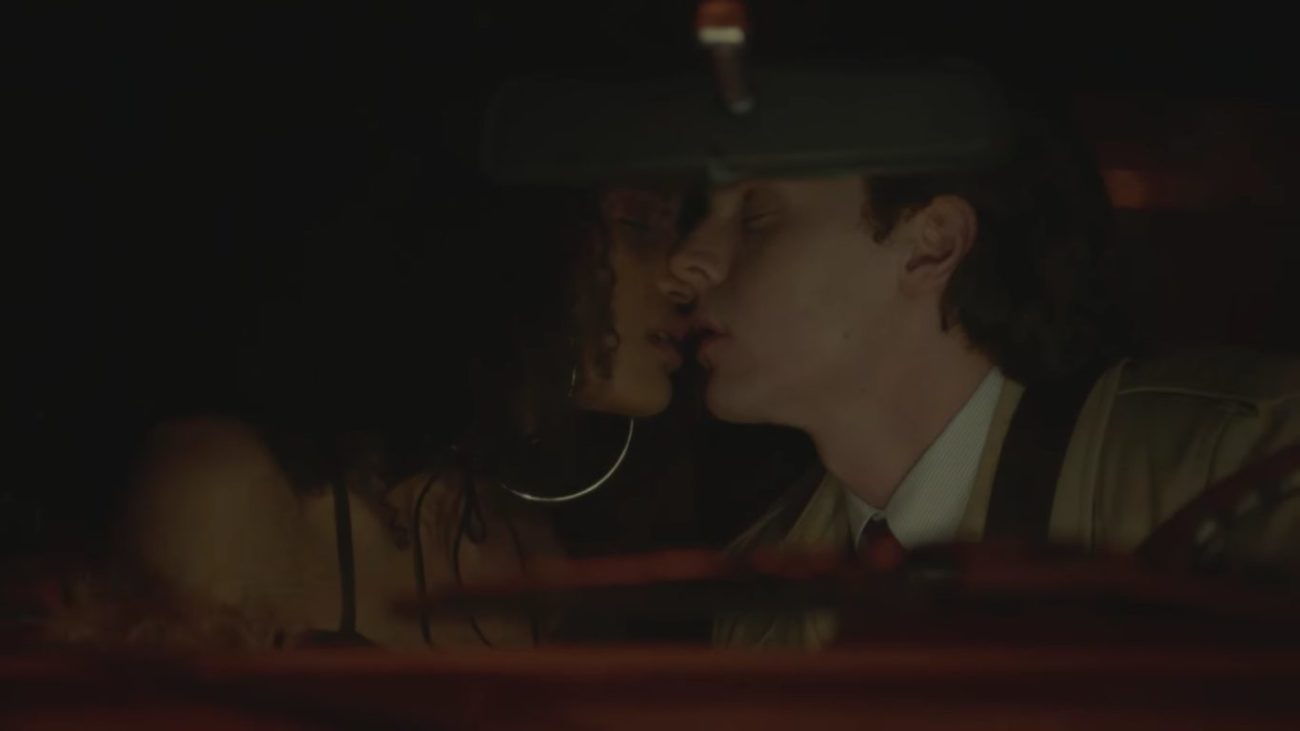
Stan is not a good or even likable person. But I love this storyline for how it shows the juxtaposition of two mindsets that were coexisting in New York in the 80s. I think Evan Peters was perfect for the part, and I admire Indya Moore for their vulnerable and courageous performance.
“I want what I’m supposed to want, I wear what I’m supposed to wear, and I work where I’m supposed to work. I stand for nothing. […] But you’re who you are, even though the price you pay for it is being disinvited from the rest of the world. I’m the one playing dress-up. Is it wrong to want to be with one of the few people in the world who isn’t? To have one person in my life who I know is real?”
—Stan
‘Never Knew Love Like This Before’
My next choice is from Season 2, and it is a dream-like tribute to one of Pose’s most iconic characters, Candy.
375 transgender people were murdered in 2021, which means that many more discovered what it feels like to be at a trans sibling’s memorial and speak words of love to someone who can’t hear them. Grief permeates Pose, largely because it is set during the AIDS epidemic. Candy didn’t die of AIDS, though, she died at “the hands of men who are weak”; her body, covered in blood and stuffed in a closet, is a shocking sight, but perhaps one that needs to be seen in order for people to understand the reality of violence against transgender women of colour and transgender sex workers.
“I got something to contribute. I got heart. I got talent […] I know who I am. I am somebody.”
—Candy
The circumstances of Candy’s death are not how she will be remembered, however. Our last impression of her is looking radiant in a red dress lip syncing to Stephanie Mills.
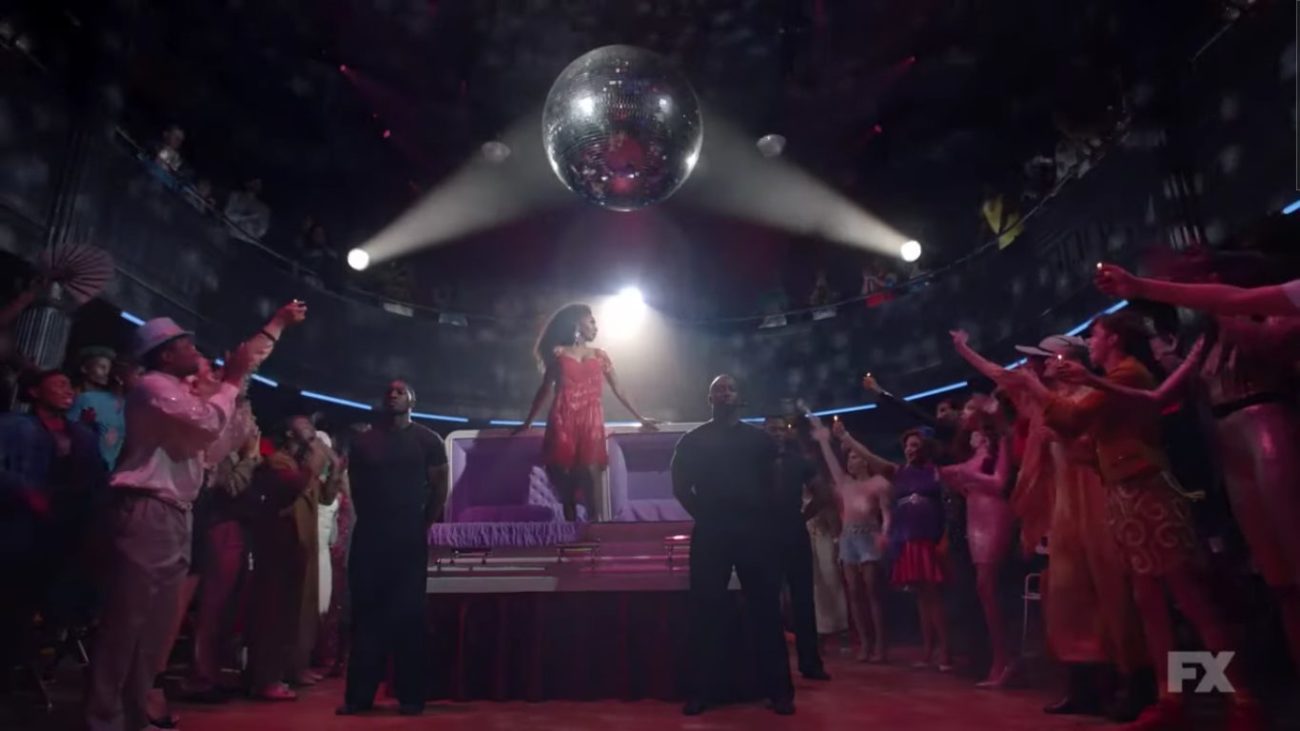
The in-fighting in the ballroom is put to one side, so that the community can come together and mourn. “She may not have been in our house but she’s our sister”, says Blanca. The lyrics “I never knew love like this before” speak of the love that Candy never would have known, if she hadn’t ever gone to the balls. And the love that she never got to feel, because it was given to her after she died. The posthumous confrontation of her parents, and the tragedy of her father’s acceptance coming too late, makes this so bittersweet.
“Gays have rights, lesbians have rights, men have rights, women have rights, even animals have rights. How many of us have to die before the community recognizes that we are not expendable?”
‘The Star-Spangled Banner’
In the Season 2 finale, we learn that Blanca’s health is in decline. Her children have moved out and on with their lives. She hasn’t been coming to the balls.
The American national anthem is repurposed by Blanca to celebrate her community. The strength of this community is demonstrated throughout the episode, for example when Pray Tell calls on their friends to take turns looking after Blanca in hospital, and when Ricky opens up about unlearning prejudice and embracing himself in the ballroom (“I can be butch and femme at the same time”).
When Angel is outed and her modelling contracts are pulled, it is a harsh reminder of why the balls are so important. “The world isn’t ready yet,” says her agent. This is why women like Angel made their own world.
“We’re supposed to be lurking in the shadows somewhere, and if anybody’s looking at us, they’re laughing.”
—Angel
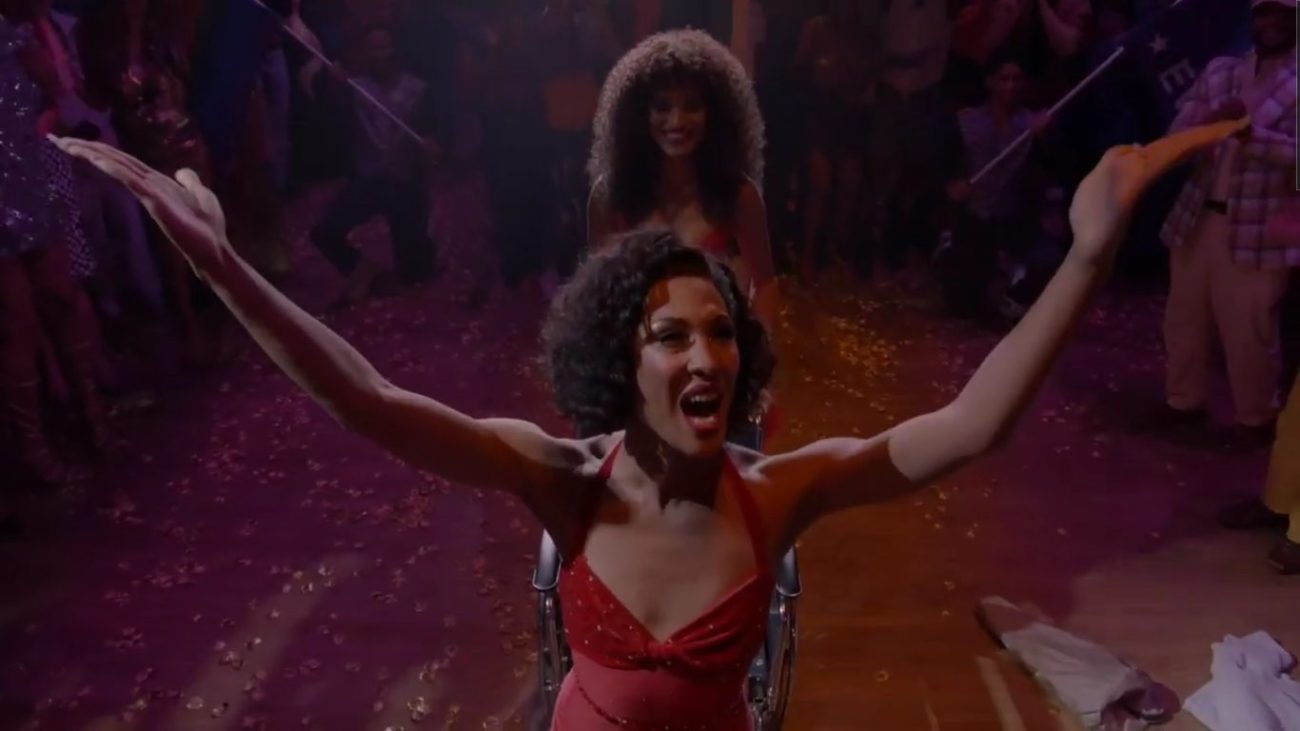
The song is a heartwarming spectacle. The LGBT+ pride flag is flown: glorious rainbow, black, and brown stripes. And the House of Evangelista flag too. Wonderful people just like Blanca lived in an America that didn’t welcome them. So Blanca reclaims this song, because in the ballroom she has witnessed the true meaning of “land of the free” and “home of the brave”.
‘I Swear’
Angel and Papi have a beautiful on-screen romance. Their proposal was suitably adorable and teary, with them both getting down on one knee. But Papi set the bar too high for himself with that proposal, so his vows had to be extraordinary.
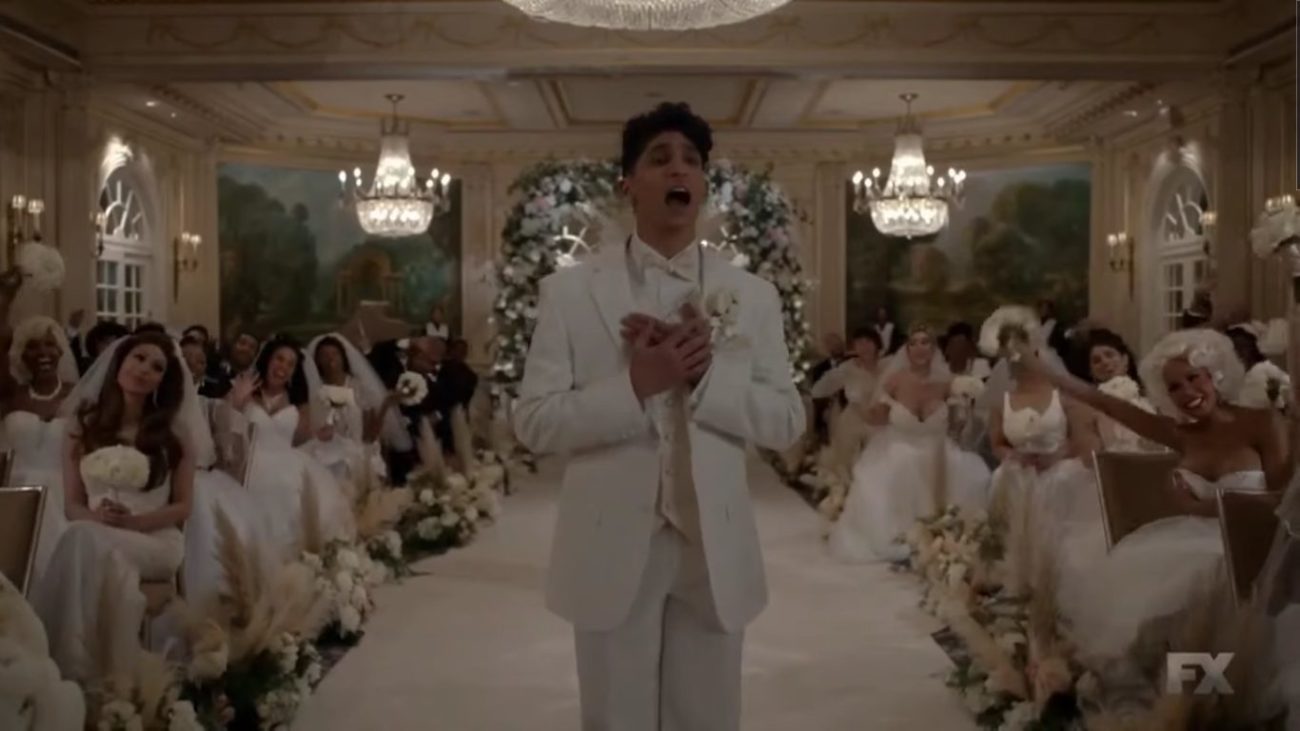
Instead of just speaking his love, he sings it. All-4-One’s ‘I Swear’, to be specific; it is a song about commitment, to reflect the challenges they’ve been through together. Moreover, the guests at the wedding join in for the chorus, showing how they are all committed to loving Angel, as a family.
The wedding episode is about family in all its forms. Papi is working hard at being a father to a child he didn’t know about. Angel is feeling insecure: “I agreed to getting married, not to being the mother of some other woman’s child”. Angel visits her father, who still stubbornly refers to her as his son, and discovers that he is “still the same person (she) ran away from”. In Papi she has found a family she doesn’t have to run from and she has everything she said she wanted in the first episode—a home and someone to take care of.
“All these years I’ve been showing up for you the best way that I know how, waiting for you to return the love that I’ve been paying for. And all this time I’ve overlooked the fact that I already have that love and support from a man. And he’s been showing up for me this entire time. And when he needed me most, Pa, I ran out on him.”
—Angel
The episode takes its time to showcase the love between Papi and his brothers, and Angel and her sisters. Even Elektra shows how full of love she truly is in her choice of gift – “let this be a reminder to you that you are deserving of everything the world has to offer”. Posthumous visitations from Cubby and Candy remind us that this is the kind of love that cannot die.
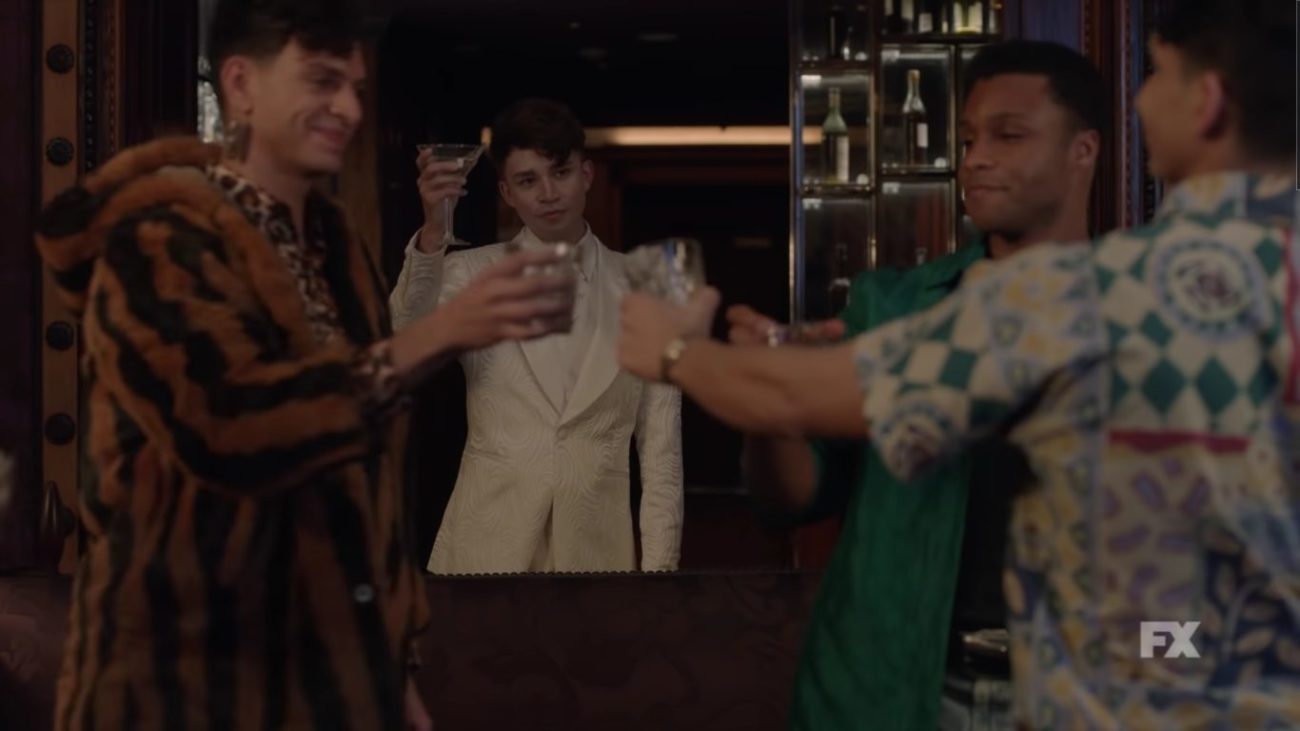
“I never had men that would stand for me, stand by me. Until I met y’all. Y’all are gay, and the whole world thinks you’re less of a man, but y’all taught me what it means to be a man […] you got to be tough to love who you want when the whole world tells you there’s something wrong with you. And there is no way I could love Angel right without y’all showing me the way and accepting me.”
—Lil Papi
In her vows, Angel speaks of her parents: “they left me out there all alone. And I had no one for such a long time. I’m sad they’re not here today, but baby, look who is”: dozens of bridesmaids, all transgender women from the ballroom, walking down the aisle in their beautiful white dresses. Papi walked with Blanca down the aisle. The ceremony was officiated by Pray Tell. The queer community, Angel’s true family, is beautiful and perfect and full of love. When they sing together, it is a joyful and moving moment.
Gay Men’s Choir
Described by Pray Tell as a “new way to protest”, the gay men’s choir in Pose was inspired by the real New York City’s Gay Men’s Chorus, which was founded in 1980. In 1991 they produced a recording of ‘Love Lives On’, which is the song the gay men’s choir is singing when we are first introduced to them. The lyric “the spirits will shine long after we’re gone” is true of all the queer people who died of AIDS who are being immortalised in stories like Pose. Queer love never dies, it is only passed on to someone new. The lyric “it seems when I found you, it was me I really found” represents how Ricky and Pray see their relationship (even as it was judged by their friends in the beginning).
On using music as a way to protest: music has the power to move people, and to inspire them into action. A collective of gay men coming together to make any kind of art is powerful. It is peaceful, and emphasises beauty. A choir also symbolises unity. There is also an important element of melancholy to their performances: “the men in white, facing forward, represent the original members of the group, who have survived the plague. The ones in black represent those we’ve lost way too soon”.
In the next episode, their voices singing ‘The Man I Love’ plays over footage of an ACT UP protest. We see Blanca scattering Pray Tell’s ashes in front of the mayor’s house. Then the auditorium is revealed and we see that every single member of the choir is wearing black with his back to the audience. We are reminded of those who were lost to AIDS, and the grief that was (and is) felt by their loved ones.
“So all else above,
I’m waiting for the man I love.”

If you haven’t seen Pose yet, I hope I have inspired you to give it a watch. And if you have, which musical moments would have made your list?

